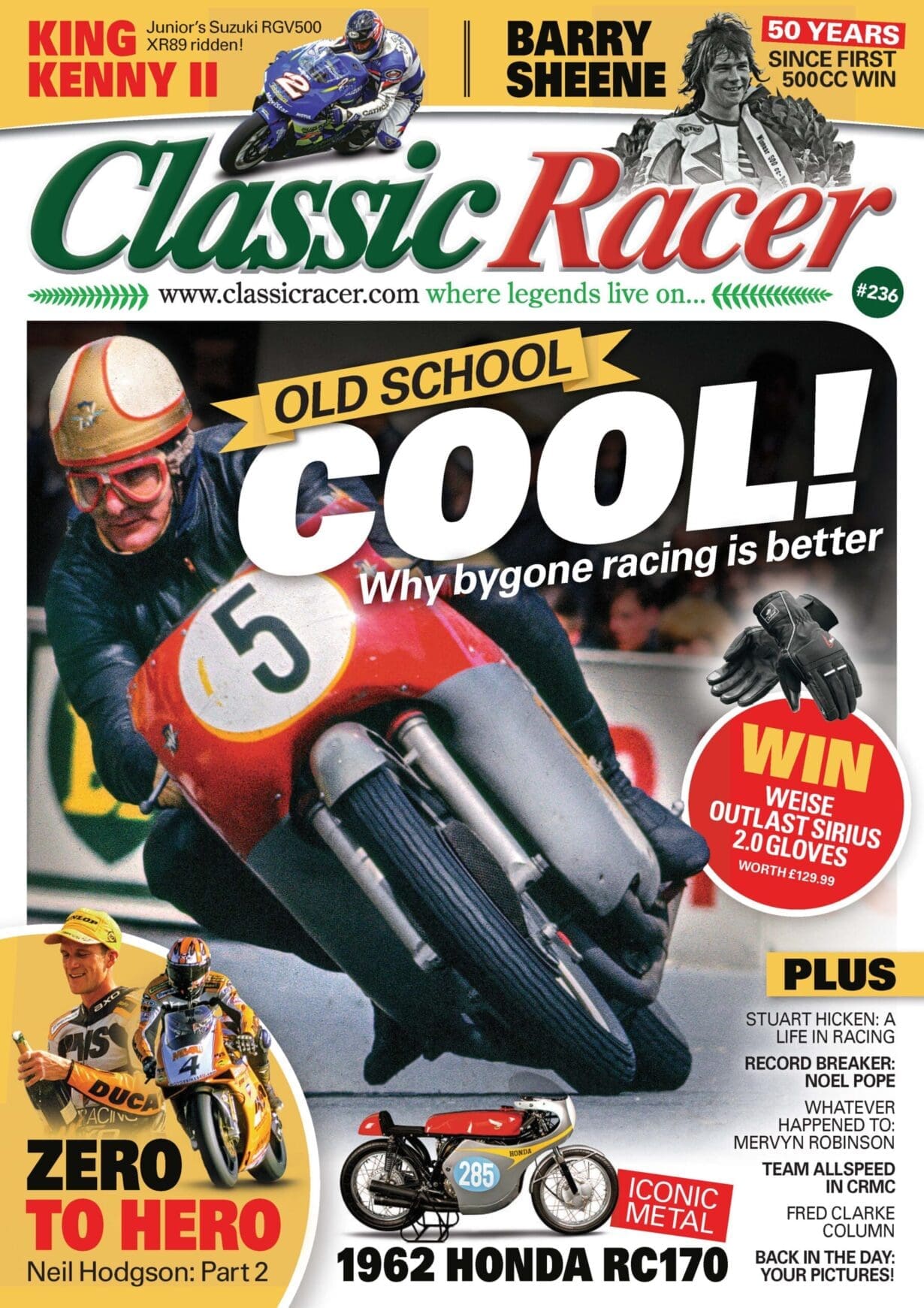The greatest rivalry of Valentino Rossi’s career was with Max Biaggi. Now that both men have retired and the dust has settled, Classic Racer discovers why they hated each other with such intensity.
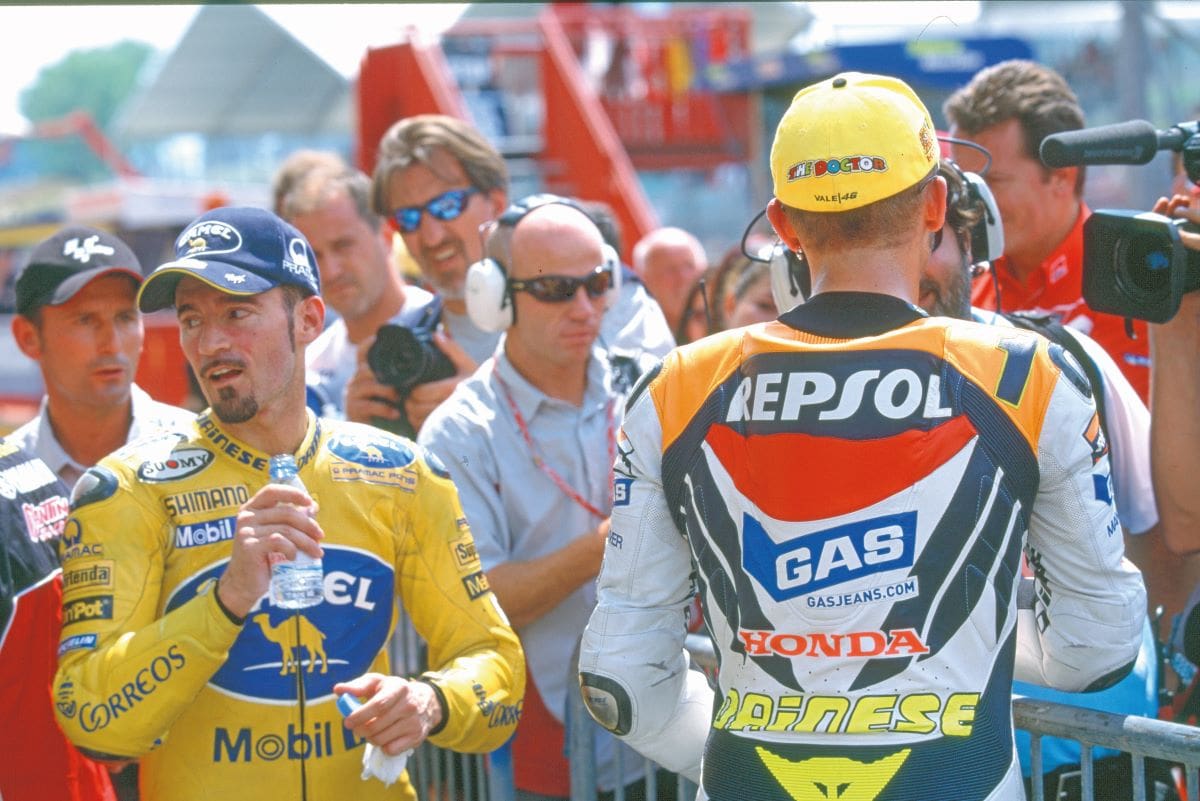
Words: Stuart Barker
Enjoy more classic motorcycle reading, Click here to subscribe to one of our leading magazines.
Photographs: Mark Wernham Collection at Mortons Archive, Clive Challinor
Valentino Rossi had many fierce rivalries during his astonishing 26-year career in Grands Prix; from Sete Gibernau to Casey Stoner, and Jorge Lorenzo to Marc Marquez, but there was no one he hated more than Max Biaggi. That the feeling was entirely mutual, only added to the drama.
And this one went deep; so deep that it started long before the two even raced against each other. Rossi made his debut in the 125cc world championship in 1996, by which time Biaggi was already a two-time world champion in the 250cc class (he would eventually win four quarter-litre titles) and already something of a nemesis to Rossi. One of Biaggi’s main rivals in the middleweight Grand Prix class was Loris Capirossi and, since Rossi was a fan of Loris, Max was bad news from the outset.
Rossi formed a dislike of his countryman from what he had read in the press, seen on television, and heard from others, and since Biaggi was also a racing rival of Capirossi, this placed him firmly in the enemy camp. Two other riders who shared a mutual hatred and intense racing rivalry were Kevin Schwantz and Wayne Rainey, the two Americans who won four 500cc titles between them from 1990 to 1993. Rossi had been a Schwantz fan, Biaggi had been in the Rainey camp. It seemed that, in everything, the pair were polar opposites.
Known as the ‘Roman Emperor’ Max was a very different character to Rossi. Sombre-faced, immaculately dressed, proud, aloof, arrogant even, Biaggi was everything Rossi was not. He preferred to eat alone (a very un-Italian trait), he cultivated his image extremely carefully, he dated famous Italian models, he was feted by the mainstream Italian press, and he had no interest in making friends in the paddock. “I don’t come to the GPs to make friends,” he stated. “I come for business, and I go home from the track as soon as I can.”
There was a troubled history behind Biaggi. He had been abandoned by his mother as an infant, hence the loner stance and the obsessional drive he displayed in everything he did; a drive fed by his need to feel worthy. There was no doubting that Biaggi was a complex character, but he was also sublime on a motorcycle. By the start of the 1997 season, he had already won three consecutive 250cc world titles and would add a fourth that year before moving up to the premier 500cc class.
And yet here was a long-haired, happy-go-lucky teenager from Tavullia starting to steal Biaggi’s thunder – and his press coverage. By 1997 as Max took his fourth 250cc title, Rossi won his first world crown in the 125cc class and started grabbing all the headlines. Motorcycle racing is hugely popular in Italy, almost as big as football. It’s a mainstream sport, which means its stars – and particularly the home-grown ones – are prime fodder for the mainstream press. Biaggi dating a glamorous model was front page news, so it must have bruised his ego when the 18-year-old Valentino Rossi suddenly became the darling of the press and began to attract all the headlines.
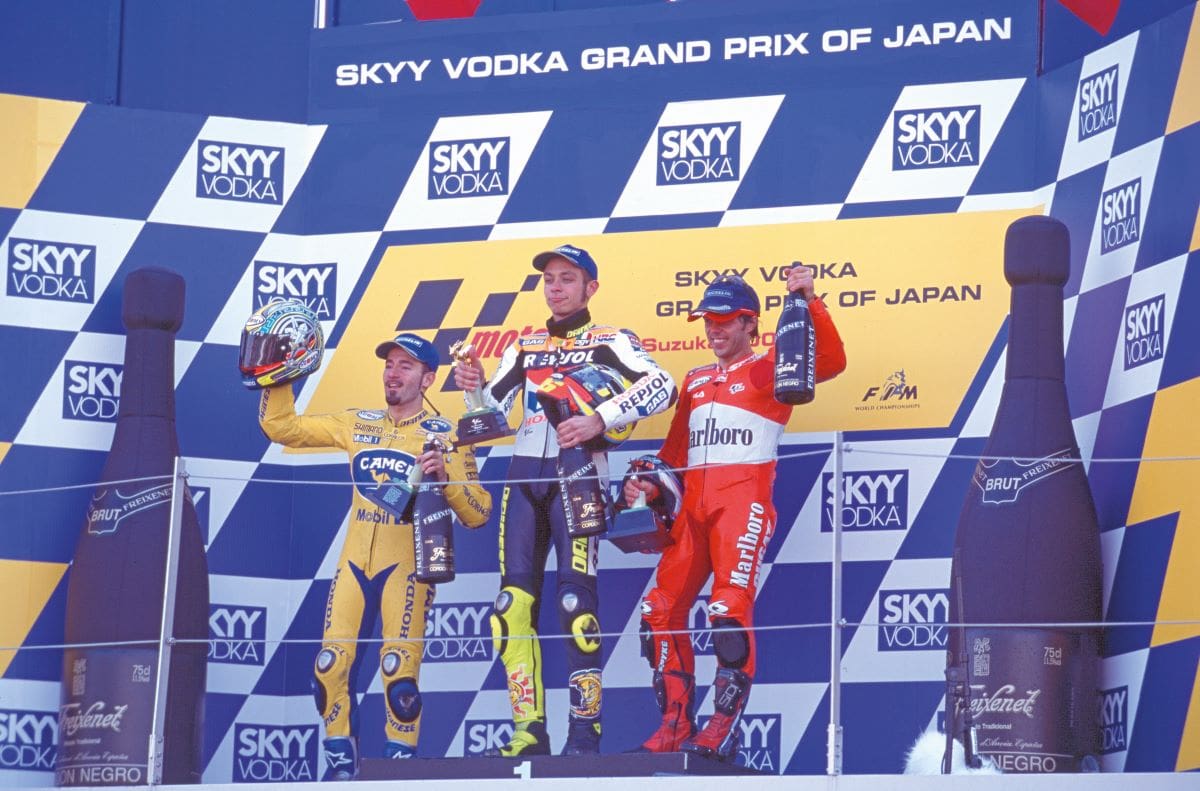
Famous
Biaggi was the first Italian rider of the modern era to become mainstream famous. Giacomo Agostini had set a precedent in the 1960s, but gossip magazines and celebrity-obsessed websites and television shows had not yet emerged, so his impact was arguably not as great. Carlo Pernat had been Biaggi’s manager before signing Rossi to race for Aprilia in Grands Prix, so he knew both men well.
“Biaggi became extremely famous outside of the sport and was constantly featured on television shows and in magazines and newspapers,” he says. “When Rossi arrived, he made a similar impact; not because he wanted to, but because the television stations and newspapers followed him wherever he went. And so, this caused a big clash about the mentality of Biaggi and the mentality of Valentino. Biaggi suffered a lot because all the media started going to Valentino as he was more fun and more likeable. Biaggi is a real champion on a motorcycle, but Valentino is so strong with people. So Biaggi was destroyed in the mind by the sheer normality of Valentino. For sure, it was a complete psychological victory.”
Although Rossi had disliked Biaggi even before he turned up in the GP paddock, the direct origins of their soon-to-be famous rivalry began in 1997 at the opening round of the world championships at Shah Alam, Malaysia. Biaggi won the 250cc race first time out on his new Honda (he had left Aprilia after a messy falling-out and switched camps to the Japanese firm) while Rossi won the 125cc race, prompting one journalist to ask Rossi if he dreamed of being the Max Biaggi of the 125 class. “I’m sorry,” Rossi retorted, “but I think it’s going to be him that dreams of being the Rossi of 250!”
He knew his barbed comment would provoke the proud Roman, but Rossi didn’t care. To him, life was a game: racing was fun – who cared what Biaggi thought? And then, at the very next round in Japan, the pair found themselves together in a restaurant at the Suzuka circuit in Japan. Spotting Rossi sitting with a group of Italian journalists, Biaggi marched straight up to Rossi: “…as if he was trying to intimidate me…” and said: “Before talking about me, you should wash your mouth out.” Within earshot of the Italian press, Biaggi couldn’t have created much more of a sensation had he pulled the pin on a live grenade. Rossi, eight years Biaggi’s junior, returned the Roman’s stare but kept his mouth shut. It would be the last time he did so when it came to Max Biaggi.
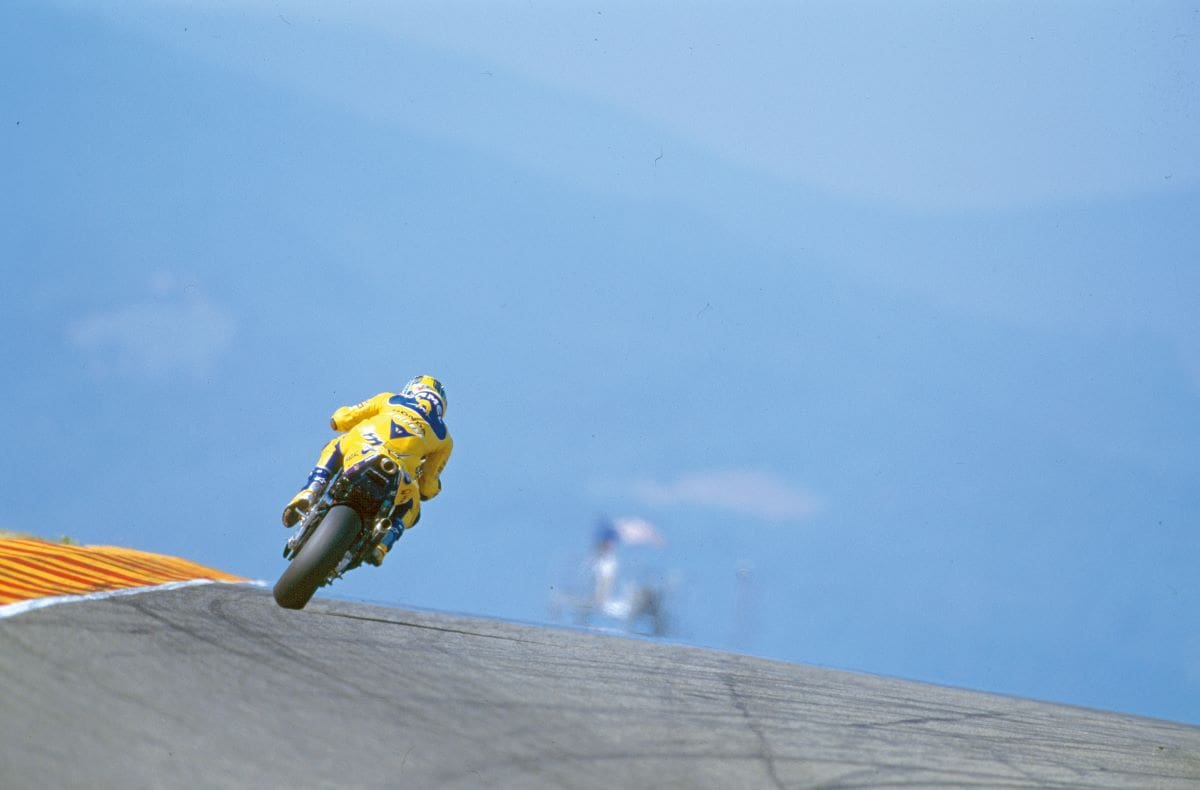
The feud between them would continue for the next 10 years in Grands Prix and would even extend beyond that: to this day, Rossi refuses to even have Biaggi’s name published on his official website. When he needs to be referred to, it’s always as XXX XXXXXX. Childish? Perhaps, but their feud would get dangerous too – there’s nothing childish about trying to elbow an opponent off a racetrack at 140mph. But that was in the future. For now, the seeds had been sown, the lines had been drawn, and the fans would have to choose which camp they were in. Most pitched their tents around Rossi’s: most, but not all.
Rossi’s rivalry with Biaggi reached new heights in the 500cc race at Suzuka in 2001. As the two were disputing 2nd place behind Garry McCoy, Rossi attempted to overtake Biaggi on the outside as the pair came onto the start-finish straight. Biaggi veered over, forcing Rossi closer and closer to edge of the track. Biaggi then thrust out his elbow and pushed Rossi away from him, off the track and onto the dirt at around 140mph.
Last laugh
“I touched with Biaggi when I tried to go round the outside of him,” Rossi said at the post-race press conference. “He lifted up his elbow, forcing me on to the edge of the gravel and I was quite scared. I had to become a motocross rider at 220kph and I can guarantee you that´s not a nice experience on a 500.”
Biaggi tried to put a bit of spin on the situation and actually blamed Rossi for his actions: “When Valentino tried to come past, he could have caused an accident – I just put my arm up to stop us from crashing.”
But the last laugh went to Rossi. After forcing his way past Biaggi on the following lap he then slowed mid-corner, took his left hand off the handle-bar, and flipped his middle finger up at his rival before going on to win the race and handing Honda its 500th Grand Prix win – at a circuit owned by the firm itself.
Rossi always maintained Biaggi’s actions had been deliberate and later offered a more detailed account of proceedings. “We had a really good fight over the first few laps. We touched a few times on the brakes but I don’t mind that because it’s racing. But on the straight he saw me coming on the outside and tried to push me off the track. He saw me and thought to himself: ‘you’re going off.’ This is very dangerous, and I was pretty scared.” Pretty scared he may have been, but Rossi certainly wasn’t scared off, as he made quite clear. “I hope it doesn’t happen next time and we put it behind us, but I don’t really mind if not.”
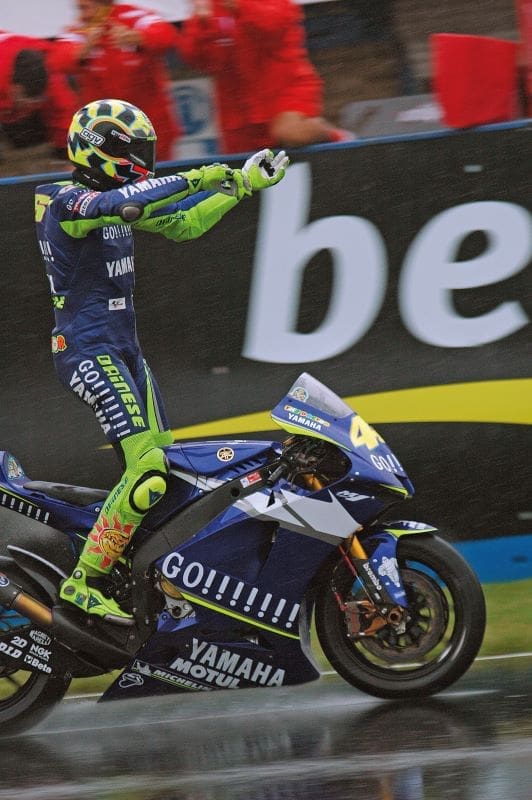
The rules were clear – there were none. Biaggi on his Yamaha and Rossi on his Honda, both now experienced in the premier class, would at last have the head-to-head they’d been building towards for years. Loris Capirossi, on another Honda, would join the party on occasion as a spoiler, but the 2001 season was all about Rossi and Biaggi.
The feud between the two was everything the Italian press had hoped for. The two greatest Italian riders of the modern era who made no secret of their hatred for each other, duelling it out round after round in pursuit of the greatest prize in motorcycle racing. The rivals were already generating endless headlines across the world but the frenzy that followed the Catalan Grand Prix took things to a whole new level. Rossi won the race quite comfortably from Biaggi (“Passing him was like the best orgasm,” Rossi would later say) but it was the post-race clash that grabbed all the headlines.
The narrow stairwell that leads to the podium at the Circuit de Barcelona-Catalunya is hidden from public view but on the day in question was crowded with officials, team members, cameramen and other interested parties. It was hot, it was noisy, the riders still had adrenalin coursing through their veins. Rossi’s crew members were excited and pumped, Biaggi’s were dismayed, and Biaggi himself was deeply unhappy at having been beaten by Rossi yet again. The Roman wanted to make his way to the podium and get it done with as soon as possible and the ongoing celebrations of Rossi and his crew were only rubbing salt into his wounds.
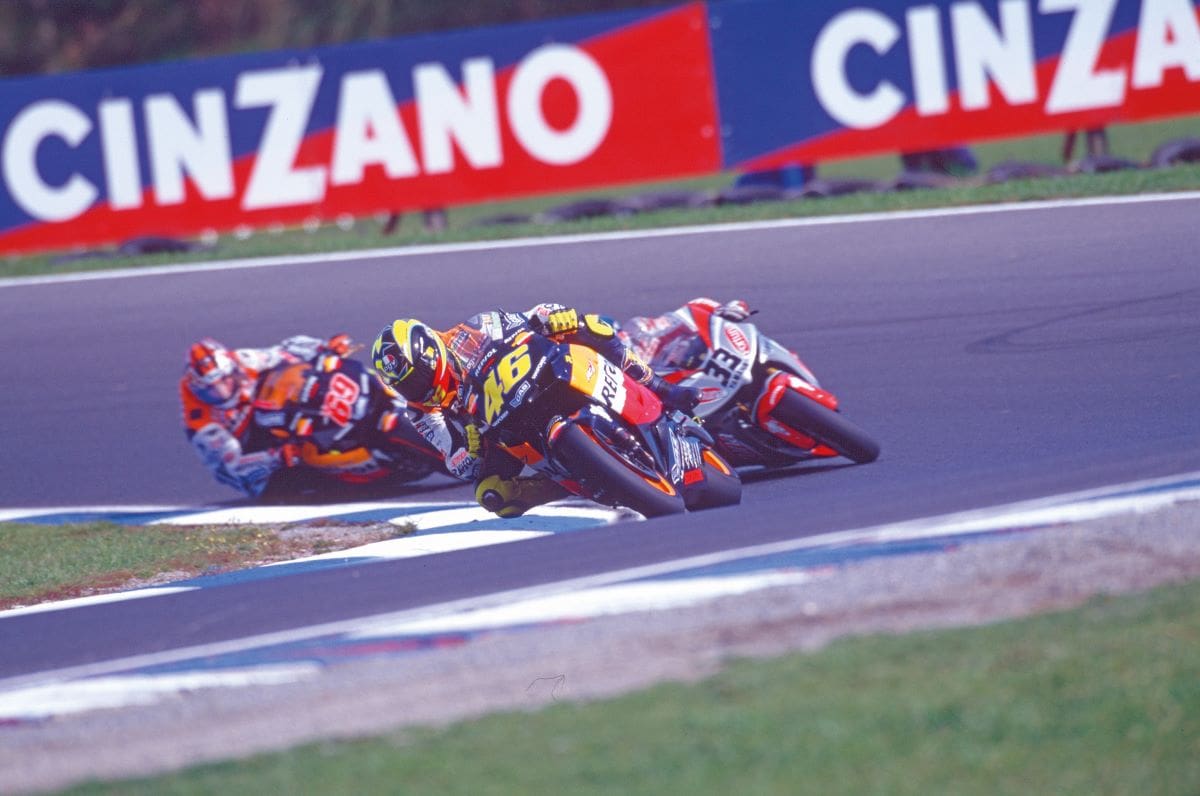
According to Rossi’s version of events, in pushing his way through the throng of people Biaggi elbowed Rossi’s manager, Gibo Badioli, out of the way. When Badioli protested, Biaggi shoved him again, at which point Rossi interceded. “I rushed up the stairs. Biaggi was waiting for me at the top. His eyes were red, he was furious. I’d never seen him like this. There were slaps and punches: people screaming.”
In Biaggi’s account, it was Rossi who pushed him before attacking him. He said at the time: “It was not very nice. He hit me when my hands were held down.” A race steward, who wished to remain anonymous, agreed with Biaggi and told The Telegraph that: “Rossi landed a solid blow to Biaggi’s face as tempers rose and they were being pulled apart.” But according to another witness, Biaggi head-butted Rossi’s team boss, Carlo Fiorani, before managing to get a blow in at Rossi as well. Whatever happened, whoever instigated events, whoever struck the most blows, it was an ugly scene and thankfully an extremely rare one in motorcycle racing.
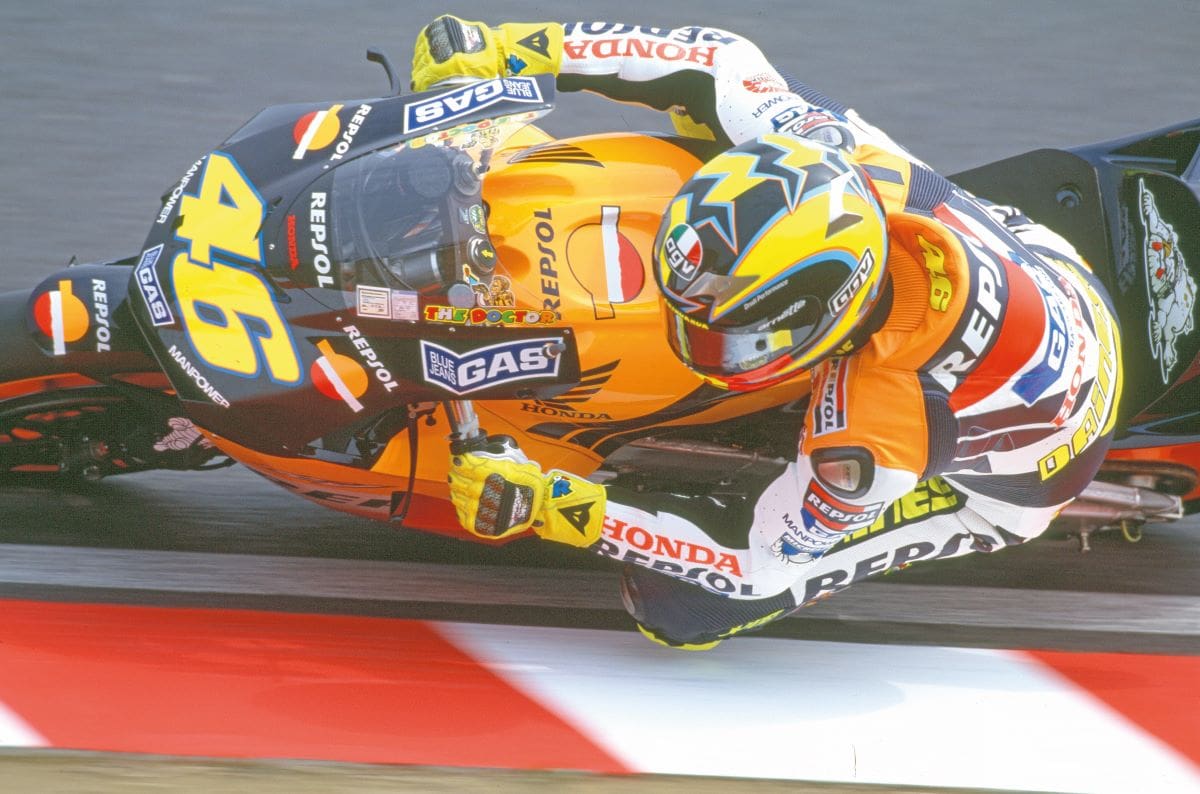
The two rivals were swiftly separated by team members and security staff, the podium ceremony went ahead, and then came the traditional post-race press conference – although none of the assembled journalists were privy to what had just happened. One particularly observant scribe did, however, ask Biaggi what had caused the mark on his face. “I must have been bitten by a mosquito,” was the Roman’s laconic reply. It was a good put-down, comparing Rossi to an annoying insect – a pest to be swiped at – but it only served to arouse the curiosity of the press. Both men tried their best to appear calm and collected and no further reference was made to the incident during the conference but, in time, the truth would out – or rather, various versions of it would.
Rossi and Biaggi were summoned to the race stewards’ office to give their versions of events. It is inconceivable that both men would escape penalties or even one-race bans in the current MotoGP paddock, but back in 2001 they were the main players, the two championship contenders, and their rivalry was galvanising a newfound interest in MotoGP worldwide. The stewards decided to let them off without any penalties being imposed. Had they penalised either rider, it would only have caused more drama. Instead, Rossi and Biaggi were told to play it down, deflect questions from the press and, most importantly, NOT to do it again. A truce was agreed upon and the two were forced to shake hands in front of photographers and journalists at the next round in the Netherlands. But the charade fooled no one; not the stewards, not the press, not the fans, and not the two riders – the pair didn’t even look at each other while limply shaking hands. They would remain the most bitter of enemies even if, from now on, as Rossi said, they would have to… ‘continue to detest each other privately.’
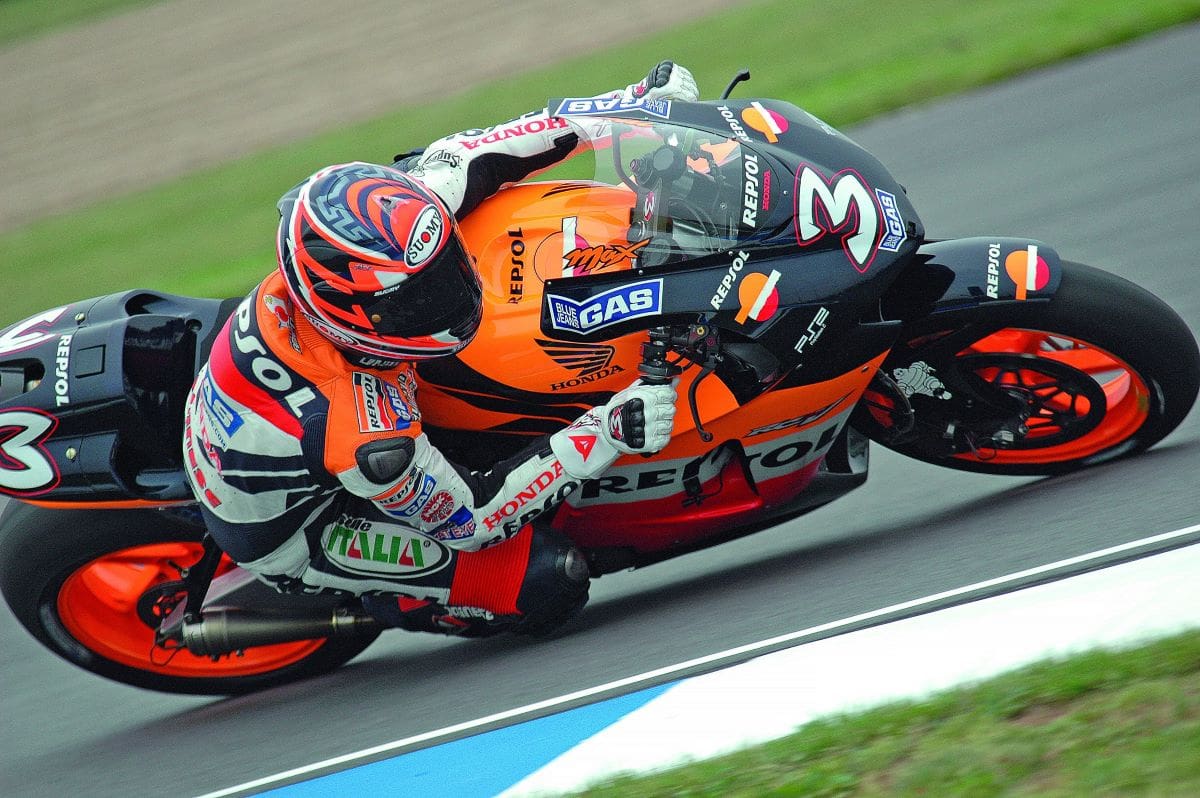
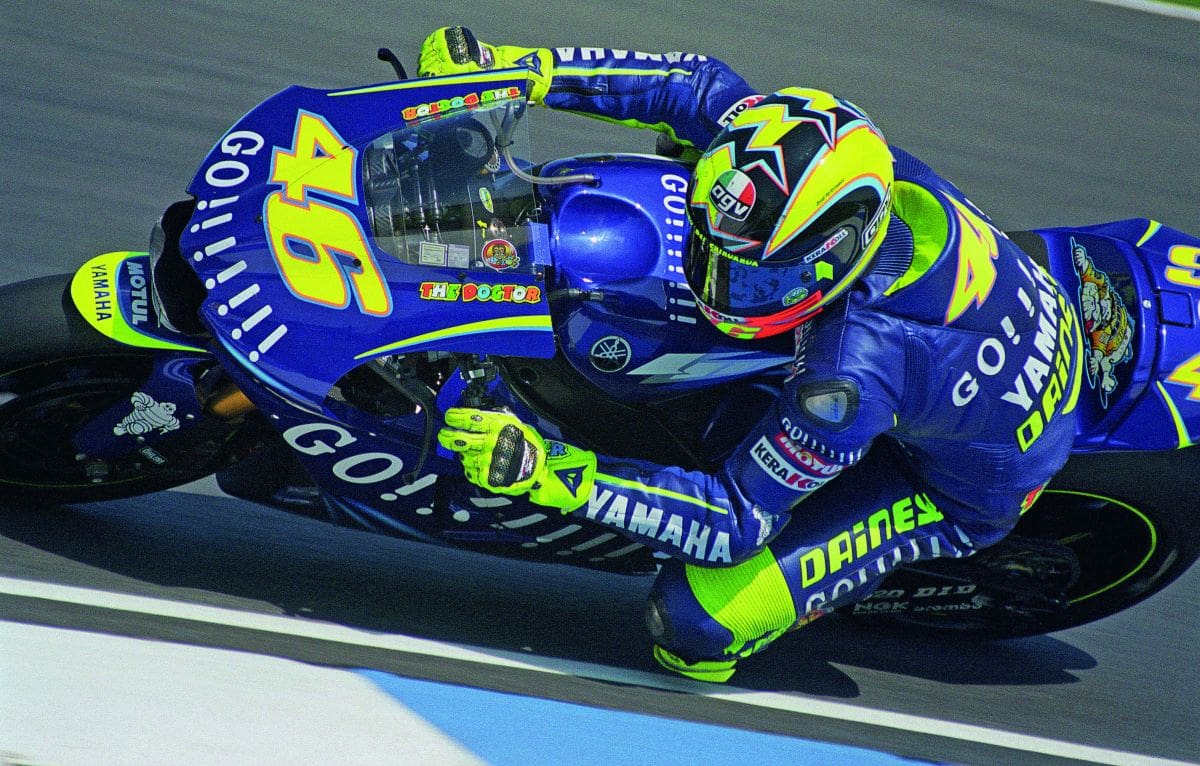
Chalk and cheese
Alison Forth worked with both Biaggi and Rossi in her role as global press officer for the factory Yamaha team in MotoGP, and it was clear to her why the two could never get along. “They were like chalk and cheese,” she says. “I’m not surprised they physically came to blows at Catalunya because they were such different characters. Max wears his heart on his sleeve much more than Valentino, so you really know what he’s thinking. I had quite a close relationship with Max – I think I was like a mother figure to him – and in some ways I actually found it easier to deal with him because I knew exactly where I stood with him, and I knew what he was thinking. Max allowed me to be a bit more in charge of him, even though he had terrific mood swings. Vale was much more in control of himself and knew exactly what he wanted, but I was probably less close to him on a personal level. But I really liked them both – they were both really nice guys in their own ways.”
Rossi would win the 2001 world championship (the last ever for the 500cc class) by 106 points from Biaggi to take his first premier class crown. In 2002, the pair would continue their feud on the new four-stroke MotoGP machines, but it made little difference: Rossi once again beat Biaggi into 2nd place in the championship and the Roman never really mounted a strong title challenge again, eventually retiring from Grands Prix in 2005 before switching to the World Superbike Championship and taking two titles in that series.
Rossi went on to win another five premier class titles but would always harbour a lingering dislike of Biaggi, even though he had comprehensively beaten him in every championship they contested together. So why did he continue to dislike him so long after their on-track rivalry had ended?
“They were just two completely different people,” Carlo Pernat says. “Valentino is a very likeable man. He is always smiling. He’s the same on television interviews as he is in a bar or in the paddock – he is full of fun. You are born with this kind of nature; you don’t learn it. Biaggi is Roman and that is another mentality. He was the first Roman rider who arrived at the top level, and he was so strong and not friendly. He was the complete opposite of Rossi – one hundred percent different, so it was impossible that these two people could be friends.”
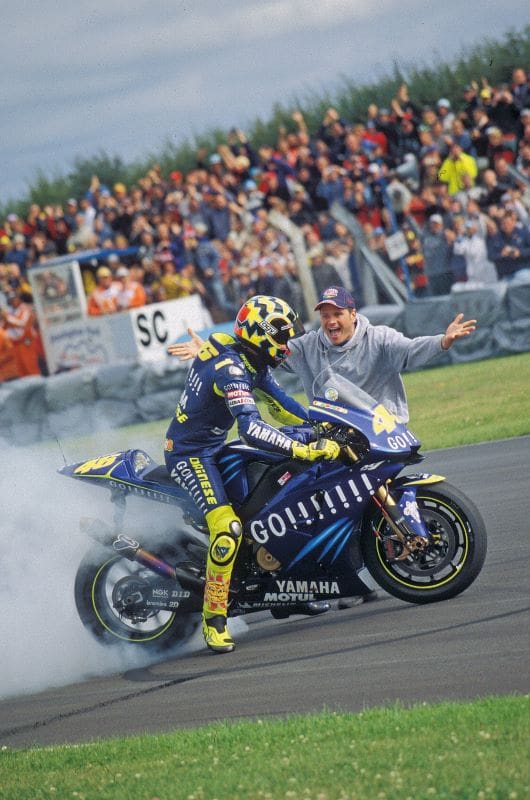
Friends they may never be, but after Rossi had announced his retirement from his astonishing 26-year career in Grand Prix racing, Biaggi’s outlook seemed to soften considerably and he acknowledged what a unique and inspiring rivalry the two had shared. “Valentino and I have animated one of the most beautiful rivalries of motorcycling, without ever pretending to be friends,” he said. “We were simply two bitter rivals, fighting to achieve the same goal. I believe this is why it was naturally impossible to be friends. I want to wish a good life to a great opponent of mine, with the thought that maybe someday we can find ourselves together smiling in memory of those moments.”
Biaggi, clearly much mellowed since retiring from racing, even went as far as to say that he would like to sit down and have a glass of wine with Rossi to reminisce about the old days. Now that would be an interesting conversation to sit in on… Wonder if we can make that work for Classic Racer?
Biaggi
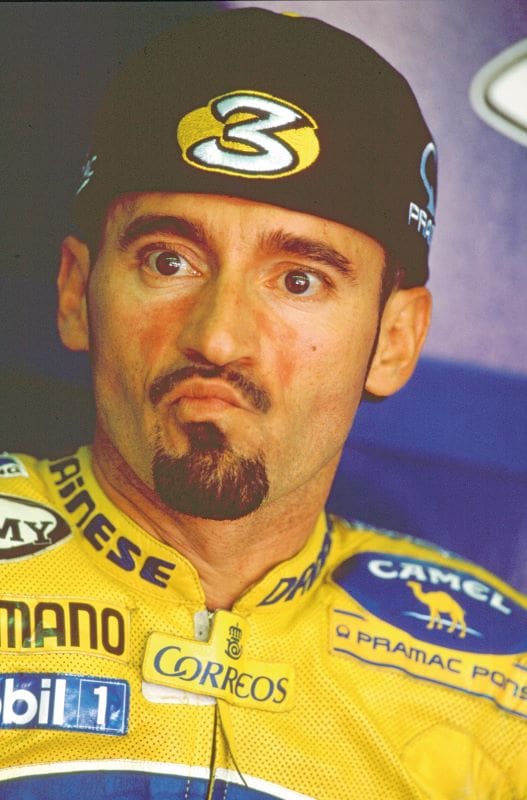
250cc wins: 29
250cc world titles: 4
500cc/MotoGP wins: 13
500cc/MotoGP titles: 0
World Superbike wins: 21
World Superbike titles: 2
Rossi
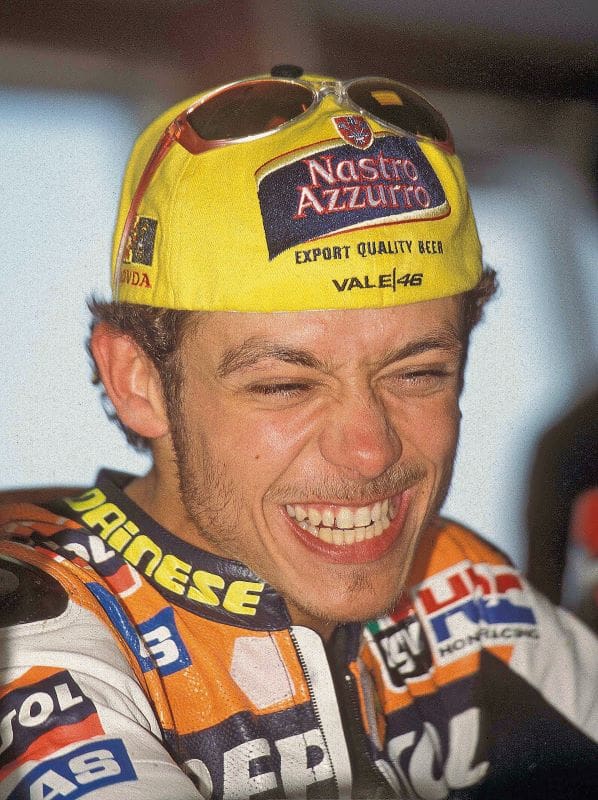
125cc wins: 12
125cc world titles: 1
250cc wins: 14
250cc world titles: 1
500cc/MotoGP wins: 89
500cc/MotoGP world titles: 7

